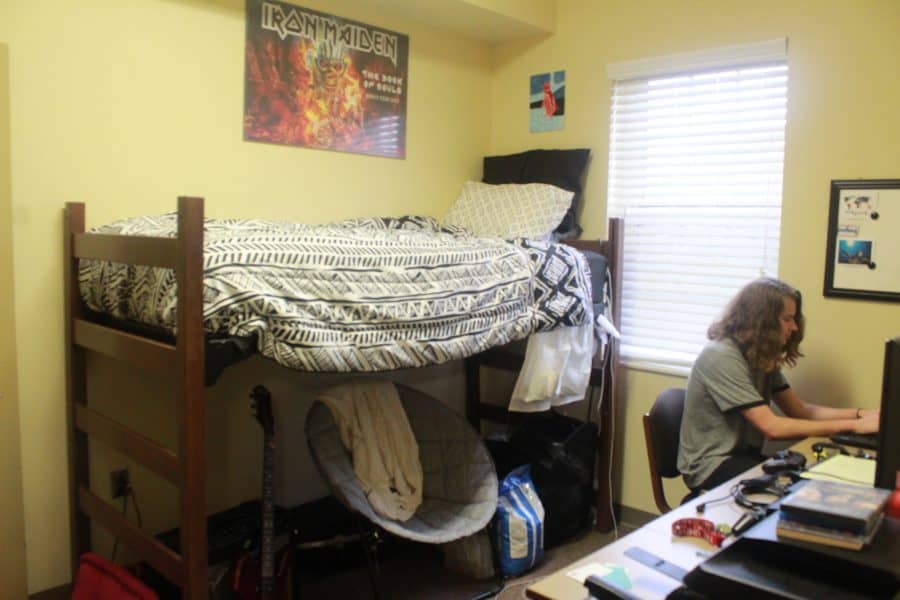Before he transferred to The University of Alabama, Graham Richards attended Maryville College his freshman year. He lived in a suite-style dorm on his own. All three extra rooms were empty. Richards had no roommates to interact with, and this left him feeling detached.
“It was tough, I definitely did struggle with depression because I felt like I was kind of isolated from everybody, and it was hard to talk to people, and so it was definitely a tough situation for me,” said Richards, now a senior majoring in secondary education.
Richards situation was rare, but he said that in a scenario in which he had three other roommates, he still thinks there is an issue with suite-style dorms due to the lack of interaction from not sharing a room.
“I think I would’ve struggled, but not as much as I did,” he said. “I definitely saw it as more of kind of like just being with my own thoughts and definitely your own thoughts hurt you more than anything else.”
At the University, there are two different types of dorms, the “traditional” style and the “suite-style.” Amanda Ingram, director of housing administration, said traditional halls automatically provide more social opportunity and interaction overwhelmingly due to sharing immediate space with another person and the community bathroom experience.
“You run into your neighbors and other residents while in the restroom, coming to and from, that type of thing,” she said. “In traditional halls, students tend to leave their doors open a little bit more, so people kind of pop their head in a little bit more and are kind of come and go a little more freely.”
Whereas in the suite-style, the setup typically consists of single bedrooms and a shared bathroom with one other person and a shared common space with two other people.
“It’s a little more limiting in who you interact with,” Ingram said. “You also have the option to really go into your room and shut the door and not necessarily have to come out and interact with other people. And so it’s just really easy if you choose to, you can very easily go through your day-to-day and not have a lot of interactions with other people. It’s not to say that you can’t, or won’t, it just takes a little more effort.”
Because of the suite-style layout, she said meeting neighbors is a little more difficult because it takes more effort than in a traditional dorm where it happens more organically by running into people outside the room.
As such, Ingram said the University is designing a new building for fall 2018. It has no final name right now, but it is nicknamed “New Freshman,” and it will have 496 beds. It is a different layout that is not currently offered on campus.
She calls it a “modified traditional” because it will hold double rooms with a private bathroom, which is a compromise between the two current styles. It will share immediate space with someone and get the roommate experience while having the perk of a private bathroom. The door will open straight out to the hallway, and there will be lots of study and lounge space throughout the building.
Avani Shah, assistant professor of social work, said social support is highly important with resilience. She found some literature on proximity and how being in close encounters with other people lend itself to developing friendships.
“There is less opportunity for socialization in the suite-style dorms,” she said.
Darrin Griffin, assistant professor of communication studies, taught a class a few years ago about interpersonal resiliency. He took a survey approach and read literature, researching as much as he could about the concept of resiliency, which is overcoming adversity, failures and barriers to your goals. What he found were many variables that help people be more resilient, but the one that tended to keep recurring is the idea of social support, which is being connected to people that have the same interest in mind.
“So, if you’re around other people who want you to succeed and are there to help you cope with failure and adversity, you think of it like web, right, everything’s pulling from every direction,” he said. “If one thing fails, there’s other things that can keep people kind of intact.”
While studying sciences at the University of Texas at Austin for his undergraduate degree, Griffin had a personal experience with social support working as a factor in resilience. He said he was having a hard time in classes and staying motivated his first semester. He perceived himself to be a total failure and assumed he would have to drop out of college. His roommate helped him see from a different perspective that perhaps he was just in the wrong major.
“It took someone from the outside to give me that perspective, but it wasn’t someone that was in my other social networks because I didn’t want to tell those people that I was failing,” Griffin said. “It was my roommate who was exposed to me in that way.”
He said he thinks social support is needed in college because having peers who are going through the same experiences and helping navigate ways to be successful increases the probability of making good decisions.
“Ultimately, I think it boils down to appropriate opportunity to work with people and to build bonds that are productive and proactive in that you build relationships and people recognize they can use those when they need to have a buffer against adversity,” Griffin said.









